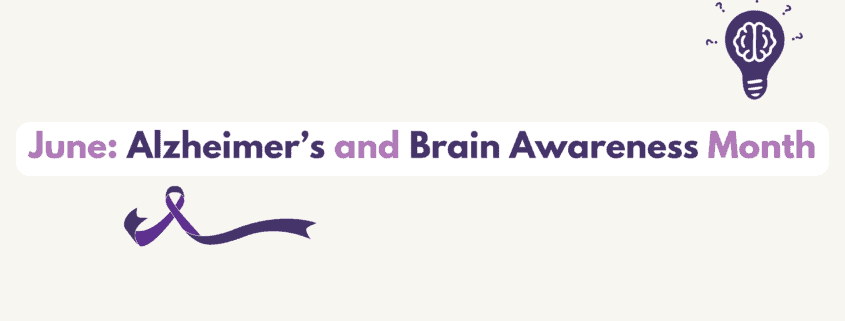
Alzheimer’s and Brain Awareness Month June 2024
June is Alzheimer’s and Brain Awareness Month! This month is a key time for raising awareness about Alzheimer’s disease and other brain disorders and serves as a reminder of the critical importance of brain health. It’s a time to educate the public about the impact of Alzheimer’s disease, advocate for those affected, and promote proactive measures to maintain brain health.
Understanding Alzheimer’s Disease
Alzheimer’s disease is a progressive neurodegenerative disorder that affects memory, thinking, and behavior. It is the most common cause of dementia, accounting for 60-80% of cases. Alzheimer’s is characterized by the buildup of amyloid plaques and tau tangles in the brain, which disrupt communication between nerve cells and eventually lead to cell death.
Key Statistics
- Prevalence: Over 6 million Americans are living with Alzheimer’s disease. This number is expected to rise to nearly 14 million by 2050.
- Impact: Alzheimer’s is the sixth leading cause of death in the United States. One in three seniors dies with Alzheimer’s or another dementia.
- Cost: The total payments for health care, long-term care, and hospice care for people with Alzheimer’s and other dementias are projected to reach $355 billion in 2021, with Medicare and Medicaid covering $239 billion of these costs.
Other Brain Disorders
While Alzheimer’s is the most well-known, many other brain disorders affect millions of people worldwide. These include:
- Parkinson’s Disease: Affects movement and can cause tremors, stiffness, and difficulty with balance and coordination. Approximately 1 million Americans live with Parkinson’s disease.
- Stroke: This occurs when the blood supply to part of the brain is interrupted or reduced. Stroke is a leading cause of serious long-term disability in the United States.
- Multiple Sclerosis (MS): A chronic disease that affects the central nervous system, leading to symptoms like fatigue, mobility issues, and cognitive impairment. Nearly 1 million people in the U.S. are living with MS.
- Traumatic Brain Injury (TBI): Resulting from a blow or jolt to the head, TBIs can have lasting effects on brain function, including memory, cognition, and physical abilities.
Maintaining and Improving Brain Health
While some risk factors for brain disorders, such as age and genetics, are beyond our control, there are several steps we can take to maintain and improve brain health. Here are some practical tips:
1. Stay Mentally Active
Engage in activities that challenge your brain. Puzzles, reading, learning new skills, and playing strategy games can help keep your mind sharp. Lifelong learning and cognitive training are associated with a lower risk of cognitive decline.
2. Exercise Regularly
Physical activity increases blood flow to the brain and encourages the growth of new brain cells. Aim for at least 150 minutes of moderate aerobic exercise each week. Activities such as walking, swimming, and dancing are excellent choices.
3. Eat a Brain-Healthy Diet
A balanced diet can help reduce the risk of cognitive decline. The Mediterranean diet, rich in fruits, vegetables, whole grains, fish, and healthy fats like olive oil, is particularly beneficial for brain health. Foods high in antioxidants, such as berries and nuts, can also help protect brain cells from damage.
4. Get Quality Sleep
Sleep is essential for brain health, as it helps remove toxins that accumulate in the brain during the day. Aim for 7-9 hours of sleep per night. Good sleep hygiene practices include maintaining a regular sleep schedule, creating a restful environment, and avoiding screens before bedtime.
5. Manage Stress
Chronic stress can take a toll on the brain. Techniques such as mindfulness, meditation, deep breathing exercises, and yoga can help reduce stress levels. Finding healthy ways to cope with stress is crucial for maintaining cognitive health.
6. Stay Socially Connected
Social interaction can have a positive impact on brain health. Engaging in meaningful conversations, participating in group activities, and maintaining strong relationships can help keep your brain active and reduce the risk of cognitive decline.
7. Protect Your Head
Preventing head injuries is essential for brain health. Wear helmets when biking or playing contact sports, use seatbelts, and take precautions to prevent falls, such as keeping your living space clutter-free and using non-slip mats in the bathroom.
8. Avoid Harmful Habits
Smoking and excessive alcohol consumption can negatively impact brain health. Quitting smoking and limiting alcohol intake can help protect your brain from damage and reduce the risk of cognitive decline.
9. Monitor Your Health
Regular health check-ups can help detect and manage conditions that may affect brain health, such as high blood pressure, diabetes, and high cholesterol. Managing these conditions with the help of your healthcare provider can reduce the risk of stroke and other brain-related issues.
Advocacy and Support
During Alzheimer’s and Brain Awareness Month, various organizations, including the Alzheimer’s Association, promote activities and events to raise awareness and support those affected by these conditions. Initiatives such as The Longest Day, held on the summer solstice, encourage people to participate in activities they love to honor those facing Alzheimer’s disease.
Moreover, advocating for increased funding for research and improved care and support services is crucial. Greater investment in research can lead to breakthroughs in understanding, preventing, and treating brain disorders. Supporting caregivers and families affected by these conditions is also essential, as they often bear a significant emotional and financial burden.
Embracing a Brain-Healthy Lifestyle
June serves as a vital reminder of the importance of brain health and the impact of Alzheimer’s disease and other brain disorders. By raising awareness, advocating for research and support, and taking proactive steps to maintain brain health, we can contribute to a future where cognitive decline is less prevalent and more manageable. Embracing a brain-healthy lifestyle not only benefits our cognitive functions but also enhances our overall quality of life.
Leave a Reply
Want to join the discussion?Feel free to contribute!